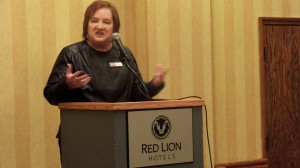State superintendent hopefuls Jana Jones and Sherri Ybarra faced tough questions during a lightning-round campaign forum Thursday in Boise.

Jones, an Idaho Falls Democrat, and Ybarra, a Mountain Home Republican, spoke to about 200 special education teachers, counselors and school psychologists at the Council for Exceptional Children’s fall conference.
The event was different from the previous three debates the candidates participated in last week. The forum was part of a four-day special education conference, and each candidate only got 10 minutes to speak and field questions.
Ybarra and Jones took the stage separately and the event was focused squarely on educators – no moderator, no bank of pre-submitted questions, no TV cameras and almost no media attention.
Jones and Ybarra each devoted their first seven minutes to introductions and the now-familiar stump speeches they have shared with educators and voters since the campaign season heated up.
When the questions came, two topics of concern emerged: how to integrate Idaho Core standards among special education students and what to do about the tiered licensure proposal that has drawn fire from skeptics such as the Idaho Education Association.
Idaho Core Standards
After winning a coin flip, Jones was first to tackle questions about Idaho Core Standards, the English and math standards that have been taught statewide for more than a year.
Jones, who previously served as the state’s director of special education and holds degrees in the field, pledged that she would provide help to school districts and teachers who are implementing the standards and working with special education students. She also said she has worked with other states and districts that have developed extended standards to reach students with Individual Education Plans (IEPs).
“There are really great programs and really great things out there if you have appropriate leadership at the state level in areas of special education,” Jones said. “We should be providing that to you, so you are not making something up.
“As state superintendent, one of the things that will be directed … is getting extended standards in for our kids with disabilities.”
Ybarra — who outlined her experience as a teacher, assistant principal, principal and district administrator — said support and training are essential.
“We know it will be the same across grade levels for special needs as it is for general education classrooms, and that’s a concern,” Ybarra said. “From the front lines, what I’m hearing from you folks as I travel, is you want access to training… (and support for) how to meet the needs of special education students in general educations classrooms as well.
“And you want a leader who understands these are some of our most vulnerable students.”
Tiered licensure
Jones and Ybarra remained consistent Thursday, echoing concerns they first shared with Idaho Education News last month.
If anything, Jones appeared to harden her stance that the proposal may not be ready for prime time.
“We don’t have all the parties at the table agreeing with what should happen with tiered licensure, let’s slow this whole thing down,” Jones said. “Let’s let the hearings happen, but I’m sure the feedback will be… confusion and upset.
“Let’s slow this down, let’s get everybody back to the table and let’s rework the whole thing.”
Ybarra was less specific in her plan of action, but reemphasized her concerns.
“Tiered licensure is a step in the right direction, however, the message that needs to come out needs to be a positive one,” Ybarra said.
Ybarra also alluded to the $175 million career ladder pay plan that proponents say must be tied to tiered licensure. Ybarra said she never recalled going to college and deciding that today she would become a rich teacher.
